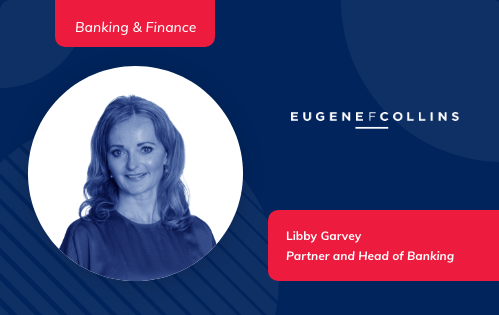Note: In March 2022 Eugene F Collins merged with Addleshaw Goddard.
Libby Garvey shares how she’s using innovative technology to help her team achieve a better work/life balance and maintain a competitive edge:
Investing in innovation through technology
With firms now shaped increasingly by the expectations of tech-savyy Millennials rising through the ranks, we’re seeing how technology is helping to reverse the deeply embedded culture of long hours in the legal sector. It’s no coincidence that the firms that are nailing lawyer retention are usually those also investing in innovation.
Working through a pandemic has thrown a whole new perspective on the need for work/life balance. Juggling family life, managing one's health and delivering home-schooling has highlighted the need for more flexibility. Two things that were fairly elusive in the transactional practice areas of commercial law within many law firms, until recently.
In the past, if you chose banking and finance as your legal specialism, long hours spent reviewing and amending mountains of paperwork were simply part of the job. But automation technology is changing this, giving firms with an innovation-friendly culture a significant competitive edge. We asked Libby Garvey, Partner and Head of Banking at the Dublin-based Corporate law firm, Eugene F Collins to talk about how she’s using innovative technology to help her team achieve a better work/life balance and maintain a competitive edge.
Giving lawyers the opportunity to thrive
By adopting disruptive technologies, such as document automation, law firms are transforming the day-to-day roles of their lawyers and the type of work juniors, in particular, are expected to undertake. A few years ago, if for example, a multi-borrower facility changed to a single borrower (but multi-obligor) facility mid-deal, a junior would be required to spend their evening making hundreds of consequential changes throughout a substantial facility agreement.
“I recall my heart sinking as I faced yet another late night changing a negotiated agreement adding or subtracting obligors, changing a bilateral agreement to a syndicated one or weaving in last-minute mezzanine finance,” Libby recalls from her early days in law. “Yes - sometimes it’s administrative work, but because of the impact certain changes can have on the legal effect of the clause, it’s essential that it is done by a lawyer. Talented lawyers have always wanted to be liberated from these mundane parts of drafting. And now, automation is allowing us to do this.”

When it comes to attracting and retaining legal talent, Eugene F Collins has an impressive track record. This is undoubtedly connected to the progressive mindset the firm has towards using technology to enhance the work of their lawyers.
“We hire excellent people, so it’s important we use them to the best of their ability” Libby says. “We have high retention rates, and this is because we offer a good work/life balance coupled with interesting work. I’ve never believed that repetitive, non-legal tasks are an integral part of the lawyer learning process. We will essentially be using Clarilis to free up talent so that their energy can be focused elsewhere, such as keeping on top of legal and market developments to anticipate new arguments and direct the course of commercial negotiations.”
Libby recognises that a certain amount of drafting work is critical to a lawyer's development and also to promote attention to detail. However, when a junior lawyer’s day is filled with a disproportionate amount of administrative drafting tasks, they understandably have little time left to keep up with commercial trends and what's happening in the wider market domestically and internationally. This is something Libby and the Partners at Eugene F Collins are determined to change with the introduction of automation as a facilitator.
“There's no reason why junior lawyers shouldn't be able to anticipate market trends,” Libby continues. “I want them to get involved in that side early on in their development, but in the past this was a challenge when you also needed them to spend a significant amount of time on administrative drafting. The big message here is that we’re not using automation to replace junior lawyers, but instead to free them up to be utilised to the best of their ability.”
Satisfied lawyers. Happy clients.
Tech-savvy, young lawyers are certainly on the lookout for firms like Eugene F Collins who invest in technology to enhance the working lives of their people. But it’s also something that’s on the radar of clients too. Widespread digital transformation in the commercial world is creating a more discerning, more technology-aware breed of clients that are far more demanding of their legal advisors.
“We’re definitely seeing an on-going need for agility, efficiency, and speed – timelines are getting shorter and shorter,” agrees Libby. “Technology is a critical component in our ability at Eugene F Collins to deliver our services. Our managing partner, Mark Walsh is driving the shift towards technology, and that filters down. The culture, the personality and the behaviours of the leaders in the firm permeate throughout all levels. And this is a big driver behind our constant investment in upgrading our systems and prioritising the technology aspects of our business.”
Using technology to drive efficiency and agility
Eugene F Collins may be a large firm by Irish standards, but with a little over 100 employees they have boutique proportions when compared to the London firms they can compete with, which can prove an asset when it comes to agile processes that underpin a heritage of expertise and trust built up with their client base. However, the quality of their lawyers, combined with the use of technology to drive efficiencies, means they’re also continuing to successfully nurture a client list of high-profile lenders.
“We’re a solutions driven, practical and commercially focused law firm,” Libby says with considerable pride. “We apply this philosophy not only in our dealings with clients but in our management and resourcing of the firm. We keep our numbers lean and hire only where there’s an actual need as opposed to taking pre-emptive approach. The advantage of this is that our lawyers, including our juniors, operate at full utilisation.”
“There are inevitable risks in this approach,” she points out. “For example, what happens if a junior decides to move on? Thankfully this is something we rarely have to deal with. By introducing Clarilis, we’re taking further steps to minimise the risk that can arise from unexpected changes in resource levels.”
A more progressive perspective on automation
In our experience, firms like Eugene F Colins are maximising the value of investing in technology because they can see beyond the face-value, profit benefits of automation. While maximising efficiencies and therefore profitability is undeniably an important measure of a successful automation, what more progressive firms also see is the freedom it gives lawyers to flourish in their role. This not only helps with attracting and retaining lawyer talent, but also enhances work/life balance, lawyer wellbeing and client experience simultaneously.
“Talented lawyers have always wanted to be liberated from these mundane parts of drafting. And now, automation is allowing us to do this.”
Libby Garvey
Partner and Head of Banking, Eugene F Collins


